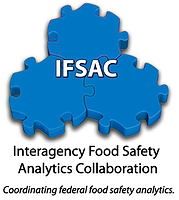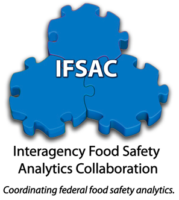New Report: IFSAC Releases 2017 Foodborne Illness Data

The Interagency Food Safety Analytics Collaboration (IFSAC) has released its Foodborne Illness Source Attribution Estimates for 2017. The annual report estimates the degree to which four pathogens—Salmonella, Escherichia coli O157, Listeria monocytogenes, and Campylobacter—and specific foods and food categories are responsible for foodborne illnesses. The U.S.-based report uses multi-year outbreak surveillance data. Here are some quick facts about this latest report:
- 1,329 foodborne disease outbreaks that occurred between 1998 and 2017 were analyzed
- Salmonella illnesses were attributed to a wide variety of foods—seeded vegetables (like tomatoes), chicken, fruits, eggs, pork, beef, and nuts.
- In over 75 percent of E. coli O157 cases, illnesses were most often linked to vegetable row crops (like leafy greens) and beef.
- While more than 75 percent of Listeria monocytogenes illnesses were linked to dairy products and fruits, the rarity of Listeria outbreaks makes these estimates less reliable than those for other pathogens.
- Non-dairy Campylobacter illnesses were most often linked to chicken.
For a deeper dive into IFSAC’s data, methods, and results, see the full report at CDC.gov.
IFSAC, created in 2011, is comprised of three federal agencies—the U.S. Centers for Disease Control and Prevention, the U.S. Food and Drug Administration, and the U.S. Department of Agriculture Food Safety and Inspection Service. IFSAC’s goal is to improve coordination of federal food safety analytic efforts and address cross-cutting priorities for food safety data collection, analysis, and use.
The updated estimates, combined with other data, may help shape agency priorities and inform the creation of targeted interventions that can help to reduce foodborne illnesses caused by these pathogens. As more data become available and methods evolve, attribution estimates may improve. These estimates are intended to inform and engage stakeholders and to improve federal agencies’ abilities to assess whether prevention measures are working.
Sign up for Food Safety Magazine’s bi-weekly emails!
Subscribe to our podcast: Food Safety Matters!
Looking for a reprint of this article?
From high-res PDFs to custom plaques, order your copy today!





